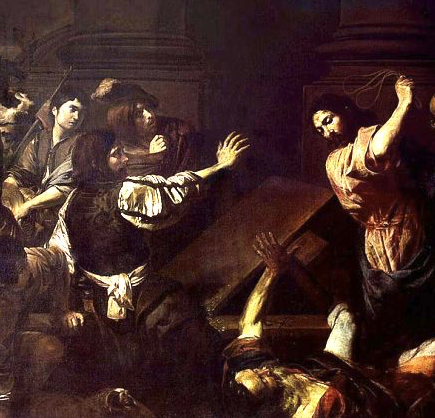Jesus and Wealth – Part Three

Jesus
Whatever we know about Jesus comes from prejudiced sources, but scholars are pretty good about separating the wheat from the chaff. Even so, although we may have identified the sources, the fact is that they can be interpreted in a variety of ways. Any portrait of the man is, therefore subject to continual critical examination. With that caveat, I will present the Jesus that I see emerging from the sources. These sources include the four gospels found in the Christian writings, as well as the gospel of Thomas, recognized by scholars as having equally authentic material. Of course, the written documents are themselves based on oral reports, some of which became written sources that were in turn, combined later into the final gospels. One of these pre-gospel written sources is the so-called Q document, which, along with Mark, is found almost in toto in both Luke and Matthew. [For a more complete discussion of these sources, see my essay “The Story of Jesus” in www.progressivechristianity.
Nazareth
Before looking at the later teaching and wandering of Jesus, let’s look first at his background. He was born in Nazareth, a small hamlet in northern Galilee. Tucked in the hills away from roads and trade routes, Nazareth was comprised of a handful of extended families. Recent archaeological digs reveal chambers dug into the floors of homes with a second/third layer of chambers even deeper. Why? The suspicion is that, although out of the way, the tax collector came through looking for taxable grain and wine, hidden out of sight in the secret depths. It is also suspected that young men would hide down there when armies moved through looking for new recruits. A town without a synagogue where folks could neither read nor write, Jesus’ hometown.
A very small town, yes, but not isolated from the troubles of the greater society. In fact, Nazareth was a one hour walk from Herod’s new restoration project happening in the city of Sepphoris. Although previously grandiose, the city had been destroyed by Rome during a rebellion, but was now being rebuilt in grand style by Herod. Of course, the project required both money and manpower. It is quite possible if not likely that Jesus daily accompanied his father Joseph to Sepphoris in search of work. And what might Jesus have seen on these day trips, both in the city and along the way? It seems most likely that he would have been exposed to the dehumanizing conditions in which many lived- the poverty, the slavery, the cruelty, the misogyny, all enveloped in the twin evils of patronage and patriarchy. It is possible that in Sepphoris he encountered rabbis from whom he could learn the Torah, but that seems unlikely. Certainly, however, he learned in ever greater detail the ways of the wealthy.
John the Baptist
Encounter with poverty and oppression might have led Jesus to seek out John the Baptist. John could be found in the wilderness baptizing people in the water of the Jordan River, a symbolic cleansing preparing the penitents for the imminent judgement of God. Setting the context for John’s fiery message, Luke quotes the 40th chapter of the prophet Deutero-Isaiah, written to the Jews who were in captivity in Babylonia: “Every valley shall be filled, and every mountain and hill shall be made low. The crooked shall be made straight, and the rough ways made smooth.” Intended and received as a message of hope for those in exile, the words speak of a God who will not abide with militaristic power and who, as God of the universe, will set his people free. Introducing the message of John with this reminder from Isaiah sets the tone for John’s demands for justice and righteousness. Powerfully, the four examples of John’s preaching found in Luke, pertain to persons of power misusing their position to oppress the poor. Tax collectors are to take no more than the empire has specified, soldiers are to collect no more than they are authorized to take, those with two tunics are to share one with the poor, and those with food must share with those who have none.
“John said to the crowds coming out to be baptized by him, “You brood of vipers! Who warned you to flee from the coming wrath? Therefore, bear fruits worthy of repentance, and do not begin to say to yourselves,‘We have Abraham as our ancestor,’ for I tell you, God is able from these stones to raise up children to Abraham. Even now the ax is lying at the root of the trees; therefore every tree that does not bear good fruit will be cut down and thrown into the fire.” And the crowds asked him, “What, then, should we do?” In reply he said to them, “Whoever has two coats must share with anyone who has none, and whoever has food must do likewise.” Even tax collectors came to be baptized, and they asked him, “Teacher, what should we do?” He said to them, “Collect no more than the amount prescribed for you.” Soldiers also asked him, “And we, what should we do?” He said to them, “Do not extort money from anyone by threats or false accusation, and be satisfied with your wages.” Like the many prophets before him, John’s message was direct and incapable of misinterpretation.
Following his life in Nazareth that possibly included day trips to Sepphoris looking for work, the next training ground for Jesus was a brief time with this same John the Baptist in the wilderness, hearing again that injustice is not the way of the Lord. It seems that by now the die had been cast. The time had come for Jesus to take up the battle. And so began the work of an itinerant Jewish peasant preaching a gospel of love and justice for one another and offering an alternative to the patronage and patriarchy that was the structure of the Roman domination system.
~~~~~~~~~~~~~~~

